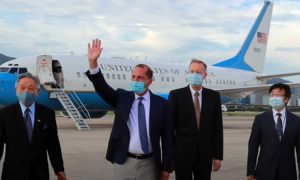Taiwan and the United States may not be official diplomatic allies, but the two countries have continued their embrace after the conclusion of the highest-level U.S. official visit to the island in decades.
U.S. Health and Human Services Secretary Alex Azar concluded a three-day visit to Taiwan on Wednesday, during which he met with President Tsai Ing-wen along with senior officials including Health Minister Chen Shih-chung and Foreign Minister Joseph Wu.
The visit precipitated Tsai’s proclamation on Wednesday that Taiwan would pursue closer security ties and a trade agreement with the United States, with whom she said Taiwan’s relationship “has never been closer.”
A trade agreement, she said, has been “hindered by technicalities that account for just a fraction of two-way trade” – a likely reference to Taiwan’s ban on importing U.S. pork and beef due to the use of the feed additive ractopamine, which is banned by about 160 countries.
U.S. President Donald Trump also praised Taiwan’s COVID-19 response during a Tuesday interview with conservative pundit Hugh Hewitt. “They’ve done well,” he said. “We’ve done well also. We get no credit for it.”
Taiwan has confirmed just 481 COVID-19 cases and has not reported a case of local transmission in over four months. The United States has reported more than 5.4 million COVID-19 cases and over 170,000 deaths, both the highest totals in the world.
During his visit, Azar lent support to Taiwan’s participation in global health forums, such as the World Health Organization (WHO).
“The United States believes that Taiwan’s accomplishments should be recognized on the world stage, and that Taiwan should be able to share these lessons and its world-class expertise in international forums,” Azar said before a private meeting with Wu.
Taiwan has been blocked from participating in the annual World Health Assembly since 2017 due largely to the objections of Beijing. The Trump administration has since begun the process of pulling the U.S. out of the WHO entirely.
Azar said during his visit he would discuss alternatives to the WHO with Taiwan and other global health partners.
On Monday, Azar oversaw the signing of the first memorandum of understanding between Taiwan and the U.S. on health cooperation, including vaccine development and infectious disease control.
The American Institute of Taiwan, the de facto U.S. embassy, said in a statement the MOU “aims to enhance the health and well-being of people of Taiwan and the United States as well as promote global health security together.”
Azar’s visit was met with pockets of opposition, mostly by members of the opposition Kuomintang (KMT), who criticized the secretary for apparently mispronouncing Tsai’s name upon his arrival.
Taiwan’s government also received criticism for exempting Azar and his delegation from the usual 14-day quarantine requirement, although all members of the delegation tested negative for COVID-19 before leaving the U.S. and upon arriving in Taiwan.
The visit by Azar drew predictable criticism from Taiwan’s cross-strait neighbor.
On Monday, two Chinese warplanes briefly crossed the median line of the Taiwan Strait and retreated after being tracked by land-based missiles, according to Taiwan’s Defense Ministry.
U.S. Secretary of State Mike Pompeo lambasted China’s objections to Azar’s visit to Taiwan, saying in an interview with a conservative network that Beijing’s reaction was a sign of “weakness.”
Hsiao Bi-khim, Taiwan’s new de facto ambassador to the United States, said Wednesday that Taiwan was discussing purchasing underwater sea mines and cruise missiles from the U.S. to deter a potential Chinese invasion.
Hsiao cited a need for Taiwan to expand its asymmetric capabilities, which she described as “cost effective, but lethal enough to become deterrence – to make any consideration of an invasion very painful.”
Hsiao, a former Democratic Progressive Party (DPP) legislator with a staunchly progressive background, was appointed to her new position in June after briefly serving in an advisory role on Taiwan’s National Security Council.
Hsiao began her political career as activity coordinator for the DPP’s representative office in the U.S. before returning to Taiwan and renouncing her U.S. citizenship in 2002 upon becoming a legislator.
She’s now heading Taipei’s presence in Washington at a time both Taiwan and the United States are taking firm steps to deepen their informal yet mutually important partnership.

































